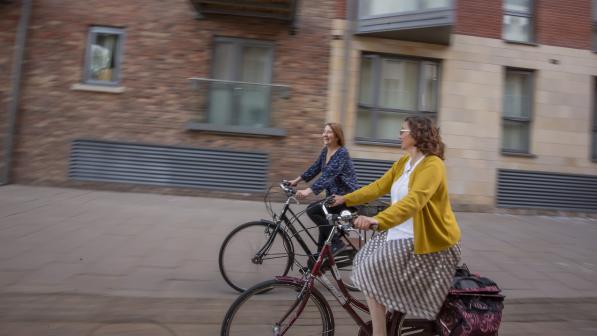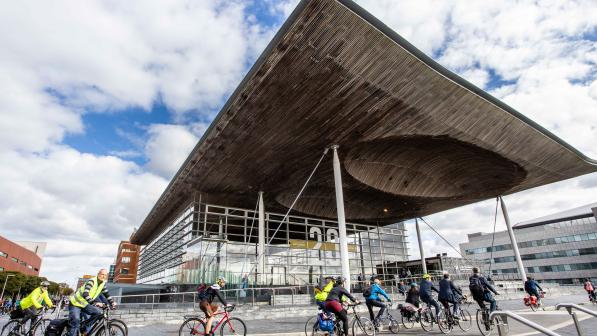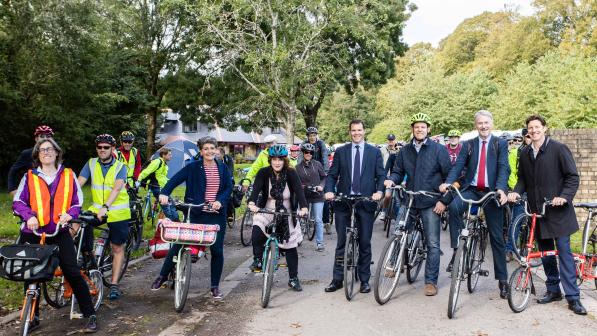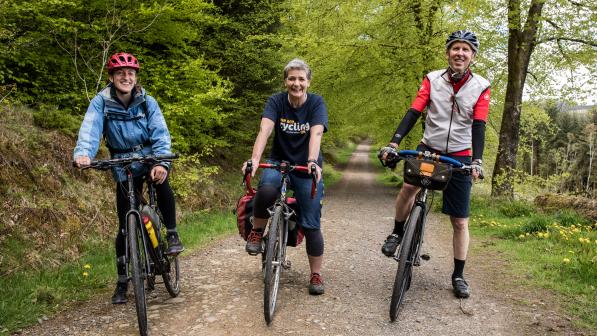Funding prospects for active travel schemes brighten in Wales

Imagine what would happen if the people who decide which transport projects to fund, and which not to fund, gave more weight to well-being than to, say, how much the economy might hypothetically reap from drivers saving a few minutes each?
This is what would happen: major new roads or upgrades to ease the passage of motor traffic would struggle for approval, but smaller schemes making it easier to travel healthily, without threatening the climate, polluting the air or bulldozing greenspace, would flourish.
What kind of amazing schemes could these possibly be, I don’t hear you ask.
Happily, Welsh Government isn’t in the dark about this either, having recently consulted on a sweeping cycling and walking-friendly overhaul to its transport appraisal guidance (WelTAG).
Setting the wellbeing scene
In 2022, Welsh Government published Llwybr Newydd, a new transport strategy pivoting around the goals of the Wellbeing of Future Generations (Wales) Act 2015, the climate emergency and the need for “fewer cars on our roads, and more people using public transport, walking or cycling.”
This, and the Active Travel (Wales) Act 2013, plus its accompanying guidance on infrastructure design, gives us reasonable grounds for predicting, rather than merely imagining, high-quality projects spurring Wales towards its decarbonisation plan Net Zero, modal shift and well-being ambitions in the not-too-distant future.
What’s more, this is a government who’s commissioned a review to judge 55 paused road schemes against its existing policies (results awaited).
But there’s still some significant obstacles, including Llwybr Newydd’s draft delivery plan which, as I’ve said elsewhere, needs rewriting; and the current WelTAG.
What’s wrong with current WelTAG?
Traditionally, transport appraisal guidance issued by each UK nation, Wales included, tends to be biased towards big, flashy projects and against the sort of schemes, typically small and focused on active travel, that are far more likely to improve our wellbeing.
This is not news. In 2004, Cycling UK (then CTC) and several allies, including CPRE, Sustrans and Living Streets, jointly set their sights on the bias plaguing appraisal in Valuing the Small: Counting the Benefits.
This highlighted the system’s propensity to exaggerate the time-savings apparently offered to drivers by large-scale schemes and, worse, convert them to a notional and equally exaggerated (and, it seems, horribly complicated to guestimate) cash value.
With all these ‘saved’ minutes aggregated and translated into many, many £££s, big road projects inevitably sparkle in the eyes of decision-makers looking for ‘value for money’.
Conversely, smaller interventions may barely attract a glance. The schemes most likely to fall by this wayside are, ironically, those helping people feel and be safer on foot or cycle, exercise while travelling, and protect the NHS and our environment.
This is despite the fact that, if their wider well-being and other impacts are accounted for, active travel projects are perfectly capable of shining investment-wise, returning about £5-6 for every £1 invested, which is very high value for money.
But perhaps the most infuriating thing about conventional appraisal is its tendency to underestimate how much extra motor traffic major schemes generate, something that has a nasty habit of clogging up new roads, making journey times unpredictable and, in the end, slowing drivers down. The result is lost, not saved, time (and, apparently, money).
And, when you also consider, as CPRE has, permanent environmental damage and scant evidence that large-scale road building actually benefits the economy anyway, what a big mess we’ve appraised ourselves into.
The proposed changes are radical for being so proportionate, for being so refreshingly fair to active travel and serving well-being far more handsomely than appraisal systems have to date. Their potential to make a long-lasting and positive difference to current and future generations is both exciting and real
Gwenda Owen, Cycling UK engagement officer in Wales
Old-style road schemes vs. active travel infrastructure
Lee Waters MS, Deputy Minister for Climate Change says he's "not prepared to spend money in future on old-style road schemes that increase the capacity of the road network or encourage people to drive faster."
Broadly speaking, appraisal has at least been trying to play more fairly by active travel over the past few years. The World Health Organisation’s tool to value (in money) a project’s physical health impacts, for example, now appears in the Department for Transport’s TAG guidance, on which WelTAG is still based.
But ministers in Wales aren’t simply padding out WelTAG to level the field. They have instead unpicked the whole approach and not put it back together like it was.
Shrewdly noting that HM Treasury’s recently revised Green Book (UK), which guides officials on appraising public sector policies, programmes and projects, recognises that expenditure must support a government’s strategic objectives to be value for money, Welsh Government has knitted its primary objectives right into its draft WelTAG – and, as discussed above, these objectives hang principally on wellbeing.
As such, they’re pedalling back on the dominance of “just adding up the costs and benefits” when comparing options. This is vital, given that benefit-to-cost ratios (BCRs) may not be at all proportionate for relatively small active travel schemes.
Hence proposals for three WelTAG levels tailored to a project’s size, scope and complexity, with the BCR-free and least bureaucratic ‘WelTAG lite’ recommended for most walking and cycling initiatives.
Draft WelTAG has also come up with two excellent substitutions: it renames the ‘economic dimension’ of the business case the ‘wellbeing dimension’; and replaces ‘impact assessment reports’ with ‘integrated wellbeing appraisals’ using both quantitative and qualitative measures.
This doesn’t mean, though, that demonstrating value for money for taxpayers’ money will be a thing of the past. Practitioners must still do this (plus establishing a scheme’s affordability, deliverability, management etc.), but the criteria will also hinge on their strategic fit with Wales’ policy principles.
Wellbeing and time saving
As for saving drivers time, ministers are no longer prepared to view them in a good light:
“If drivers save time", they say, "this tends to create more vehicle mileage, carbon, pollution, congestion, road danger and ill-health from sedentary lifestyles, and thus runs directly contrary to top-level Welsh Government objectives for climate, mode shift, air quality and social well-being.”
But, if public transport users, walker or cyclists save time, ministers will see it as a boon because:
“… this tends to reduce vehicle use and concomitant carbon emissions, toxic air pollution, congestion, crashes, etc and increase health. In these cases, the time savings support Welsh Government's top-line objectives”.
Putting this into practice, if a large and complex project is required to provide BCRs (e.g. because the funding comes from both the Welsh and UK governments), new WelTAG requires two sets, one including time-savings as a benefit, the other excluding them.
Side-by-side, these sets should crystallise any decision-maker’s high-level view on exactly how relevant and valid they are in terms of government objectives.
Cycling UK’s verdict
Although Cycling UK and our key volunteers in Wales are recommending some improvements, especially on stakeholder engagement in the appraisal process, we admire draft WelTAG’s new, bold approach.
Potentially, it’ll be used “to assess regional and larger transport interventions or groups of sustainable travel interventions, as well as at an individual project level”, making it nothing short of transformative.
As Gwenda Owen, Cycling UK's engagement officer in Wales says "The proposed changes are radical for being so proportionate, for being so refreshingly fair to active travel and serving well-being far more handsomely than appraisal systems have to date. Their potential to make a long-lasting and positive difference to current and future generations is both exciting and real."
Like this, indeed, WelTAG should rightly become the envy of the rest of the UK.







